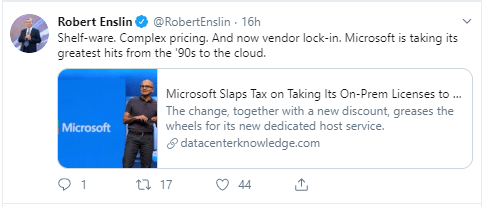- Erik Bullard
- Reading Time: 3 minutes

Microsoft recently announced Azure Dedicated Host which, in a nutshell, is another means to move your on-premise servers into Microsoft’s cloud, Azure. The differentiator is that now you can license the cloud in such a way where only your organization’s data and applications will touch the dedicated server. For a whole variety of reasons, ranging anywhere from compliance to security, this new offering is significant because it opens the door to a lot of potential new business.
Behind the scenes, however, Microsoft has made some not-so-subtle changes to their licensing agreements that make it more expensive for organizations to transfer their on-premises Microsoft solutions to any cloud that doesn’t belong to Microsoft. In other words, Microsoft is sending a clear message that it wants you running your workloads on Azure. This type of behavior is not new for Microsoft.
Making Competitive Solutions More Expensive
Traditionally, customers have been allowed to BYOL (bring your own licenses), allowing an organization to utilize their on-premise Microsoft licenses in the cloud without being subject to additional fees. While a move to the cloud has always been possible (typically through an outsourcer), you can now expect higher costs. Of course, you can always offset the additional fees by utilizing the Azure Hybrid Use Benefit which allows customers to run certain virtual machines at a lower rate if they have maintained Software Assurance on those on-premise Microsoft licenses.
Cost reductions sound great but there is a large asterisk next to that cost reduction potential; you have to use Microsoft’s cloud. If you choose a competitor’s cloud, such as Amazon Web Services (AWS) or Google Cloud Platform (GCP), Microsoft is going to hit you with increased fees. In reality, this is really just a penalty for engaging with Microsoft’s competition.
In a world where Microsoft has been comfortable being the only player in town, they are fighting to stay ahead of the emerging competition. By motivating adoption and use, utilizing the relationships they have in place (just about every Enterprise has a relationship with Microsoft in some way), Microsoft is able to motivate adoption of Azure over a competitor’s cloud simply by changing the licensing metric.
The Competition is Heating Up
This is not the only space where Microsoft is starting to feel pressure. Google has made great strides in making G Suite viable for Enterprises. Google’s increased focus on Enterprise Sales, including hiring proven enterprise executives from the competition (such as Robert Enslin who last served as president of the Cloud Business Group at SAP), highlights just how focused Google is on dethroning Microsoft.
In fact, just yesterday Enslin tweeted an aggressive response to Microsoft’s latest programmatic changes. He wrote, “Shelf-ware. Complex pricing. And now vendor lock-in. Microsoft is taking its greatest hits from the ’90s to the cloud.”
This quote is immensely powerful, especially considering Enslin doesn’t typically come after anyone as directly as he did here. As Google is trying to demonstrate that they are easier to work with and have simplified pricing, Microsoft is becoming more difficult in order to force your hand.
As the competitive landscape evolves, Microsoft has been resorting to hardball tactics to keep organizations utilizing Microsoft services and solutions. From introducing programmatic licensing changes that either motivate adoption or demotivate customers from moving away from Microsoft to increasing utilization to create more stickiness within your organization, Microsoft is doing everything they can to ensure they keep your business. You should be doing everything you can to assess whether or not that is the actually right move for you.
Please leave a comment below, follow me on Twitter @ITsourcingGURU, find my other UpperEdge blogs and follow UpperEdge on Twitter and LinkedIn.
Related Posts
- Are Firstline Workers Microsoft’s Key to Keeping Google Out of the Enterprise?
- Inside ServiceNow and Microsoft’s Intensifying Alliance
- How to Negotiate the Right Deal with Microsoft
- Microsoft Retiring Skype for Business Online to Force Teams Use
- Office 2019: The New Release Microsoft Doesn’t Want You to Buy
Related Blogs
Microsoft Increases M365 Pricing Again! What Customers Need to Know
SaaS Price Increases: What If Vendors Only Charged More When You Got More?
Microsoft Ends EA Volume Discounts: What It Means and How to Respond
About the Author

